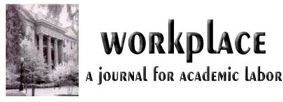Never a dull moment these days in Education activism! Parallel with the fallout from records regarding the governance and management of UBC and calls for accountability by our Faculty Association is the BCTF’s work in holding the government to account for its legislation of bargaining rights.
Of course, our Institute for Critical Education Studies has provided extensive analysis and commentary on both cases.
Keeping activism in context, we are thrilled to launch this Special Issue of Workplace: A Journal for Academic Labour:
Educate. Agitate. Organize: New and Not-So-New Teacher Movements
Special Issue Edited by Mark Stern, Amy E. Brown & Khuram Hussain
Forward: The Systemic Cycle of Brokenness
Tamara Anderson
Introduction to the Special Issue: Educate. Agitate. Organize: New and Not-So-New Teacher Movements
Mark Stern, Amy E. Brown, Khuram Hussain
Articles
Principles to Practice: Philadelphia Educators Putting Social Movement Unionism into Action
Rhiannon M Maton
Teaching amidst Precarity: Philadelphia’s Teachers, Neighborhood Schools and the Public Education Crisis
Julia Ann McWilliams
Inquiry, Policy, and Teacher Communities: Counter Mandates and Teacher Resistance in an Urban School District
Katherine Crawford-Garrett, Kathleen Riley
More than a Score: Neoliberalism, Testing & Teacher Evaluations
Megan E Behrent
Resistance to Indiana’s Neoliberal Education Policies: How Glenda Ritz Won
Jose Ivan Martinez, Jeffery L. Cantrell, Jayne Beilke
“We Need to Grab Power Where We Can”: Teacher Activists’ Responses to Policies of Privatization and the Assault on Teachers in Chicago
Sophia Rodriguez
The Paradoxes, Perils, and Possibilities of Teacher Resistance in a Right-to-Work State
Christina Convertino
Place-Based Education in Detroit: A Critical History of The James & Grace Lee Boggs School
Christina Van Houten
Voices from the Ground
Feeling Like a Movement: Visual Cultures of Educational Resistance
Erica R. Meiners, Therese Quinn
Construir Y No Destruir (Build and Do Not Destroy): Tucson Resisting
Anita Fernández
Existential Philosophy as Attitude and Pedagogy for Self and Student Liberation
Sheryl Joy Lieb
Epilogue
No Sermons in Stone (Bernstein) + Left Behind (Austinxc04)
Richard Bernstein, Austinxc04
Thanks for the continued interest in and support of our journals, Critical Education and Workplace, and our ICES and Workplace blogs. And please keep the manuscripts and ideas rolling in!

 Follow
Follow
